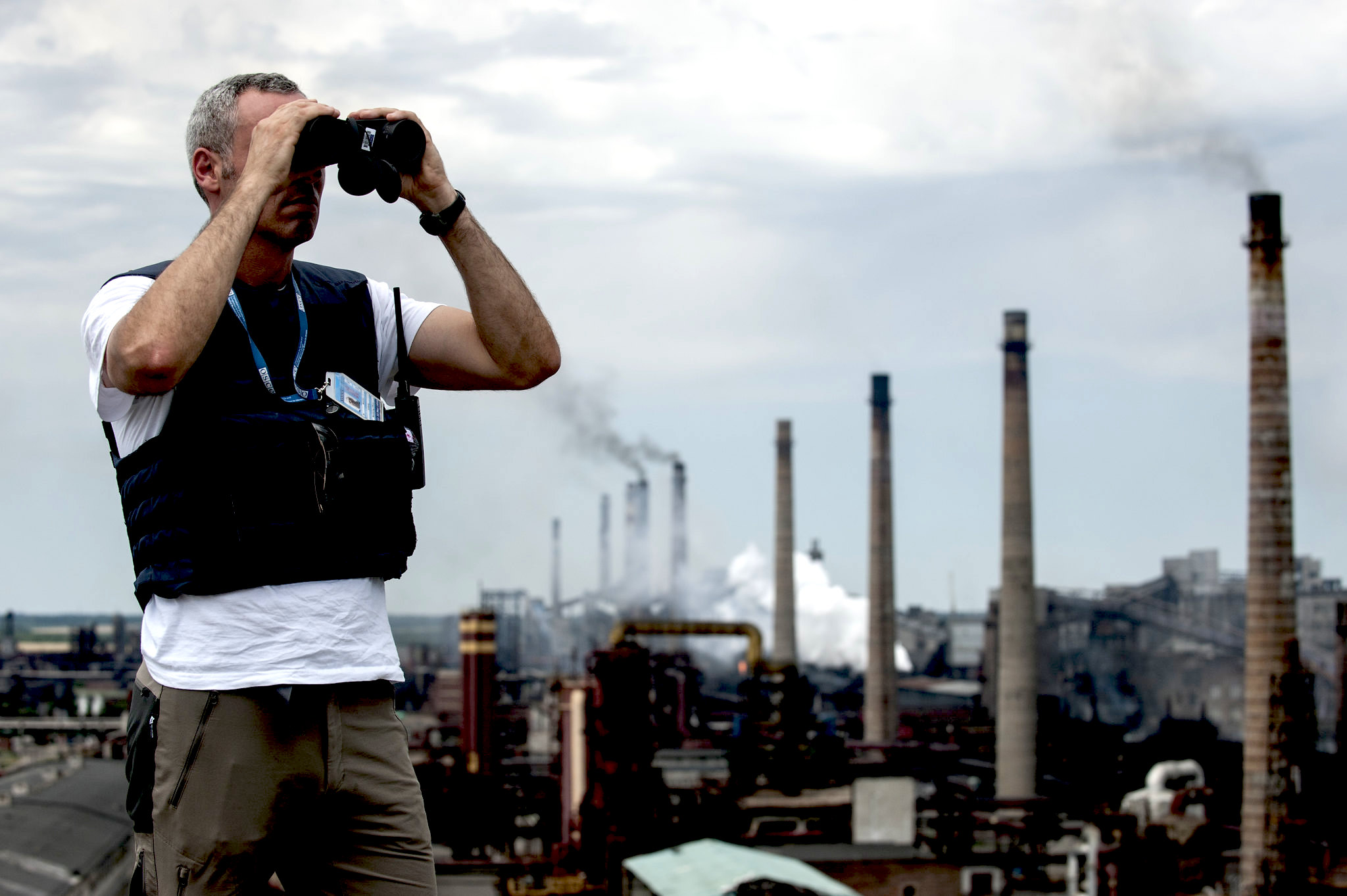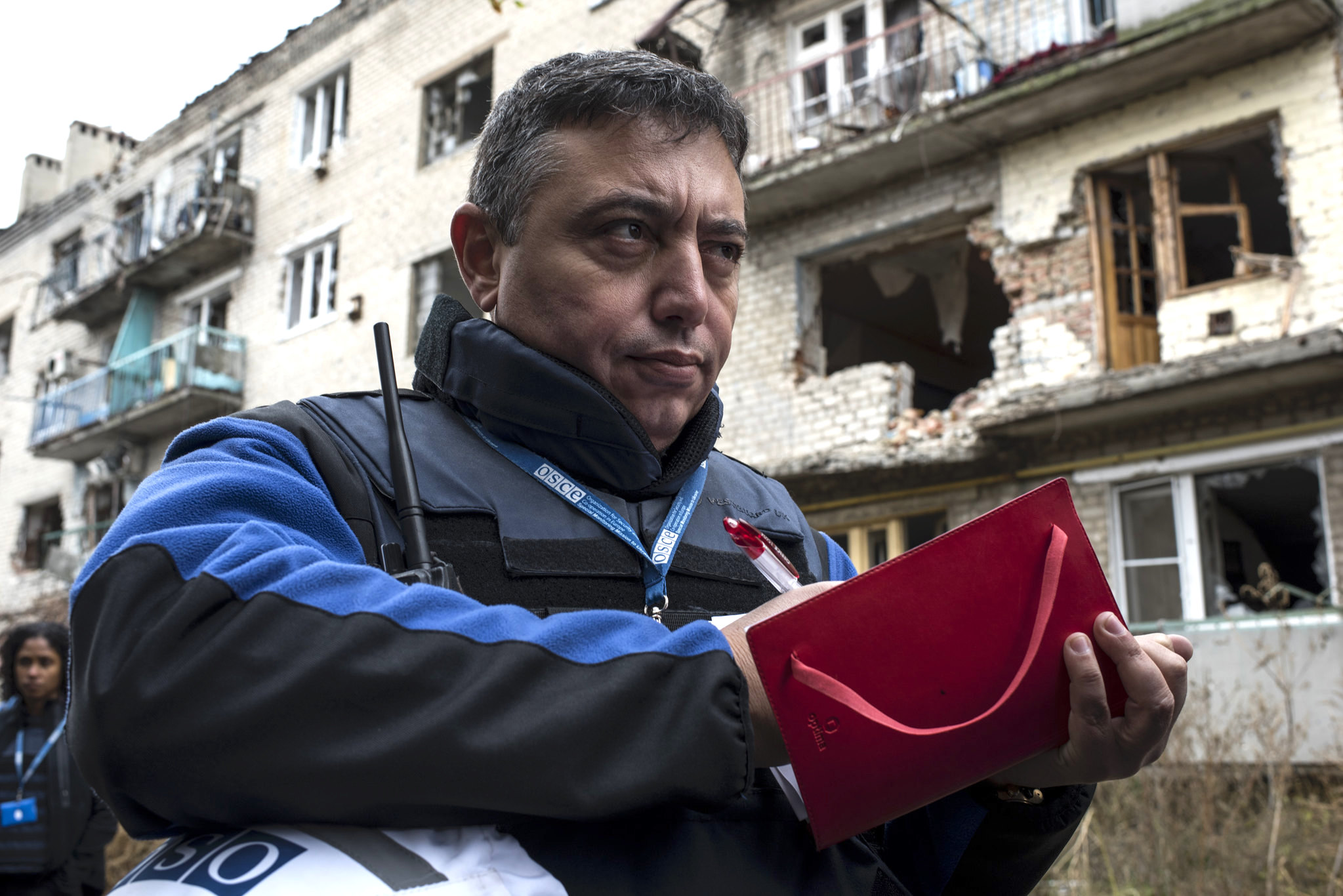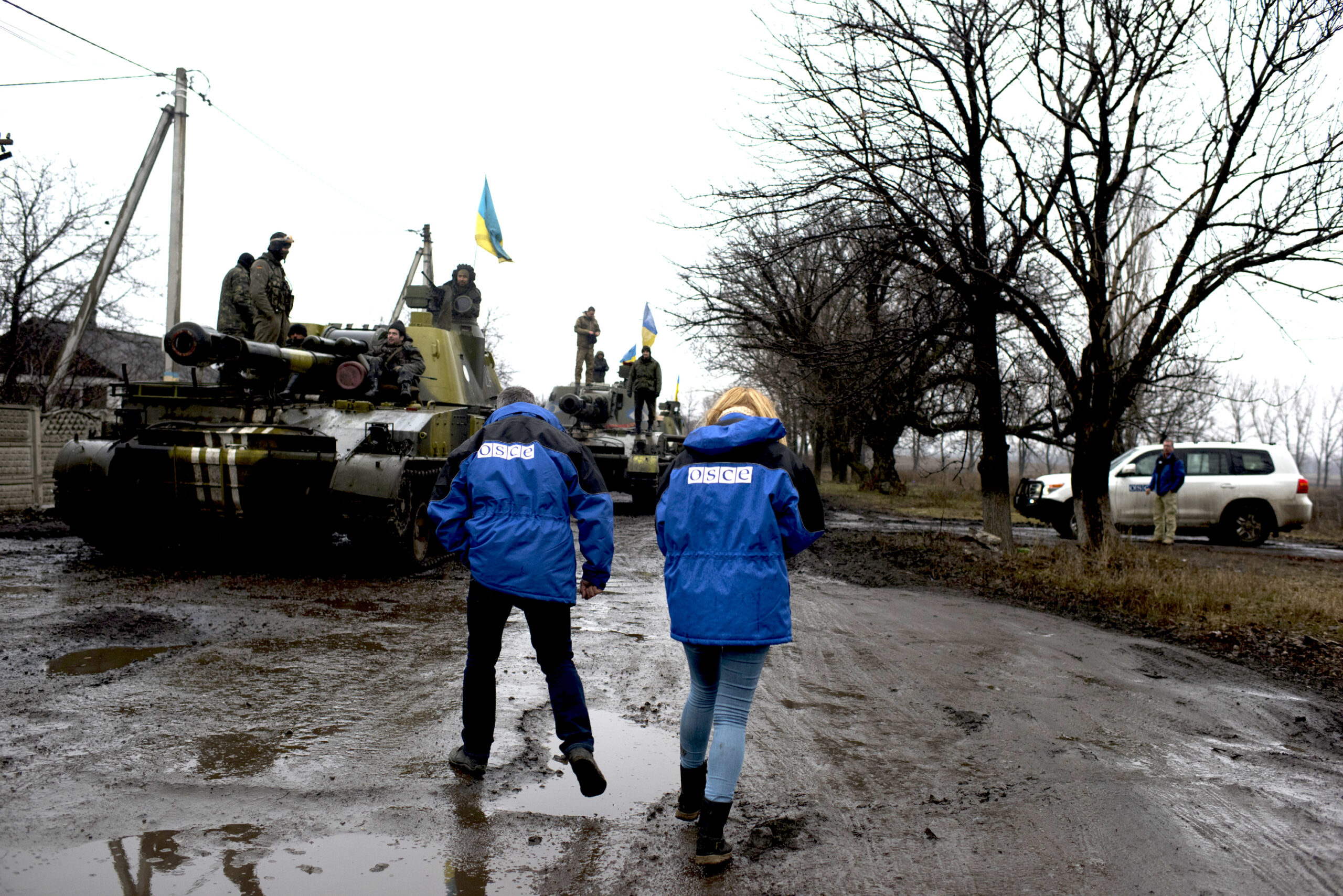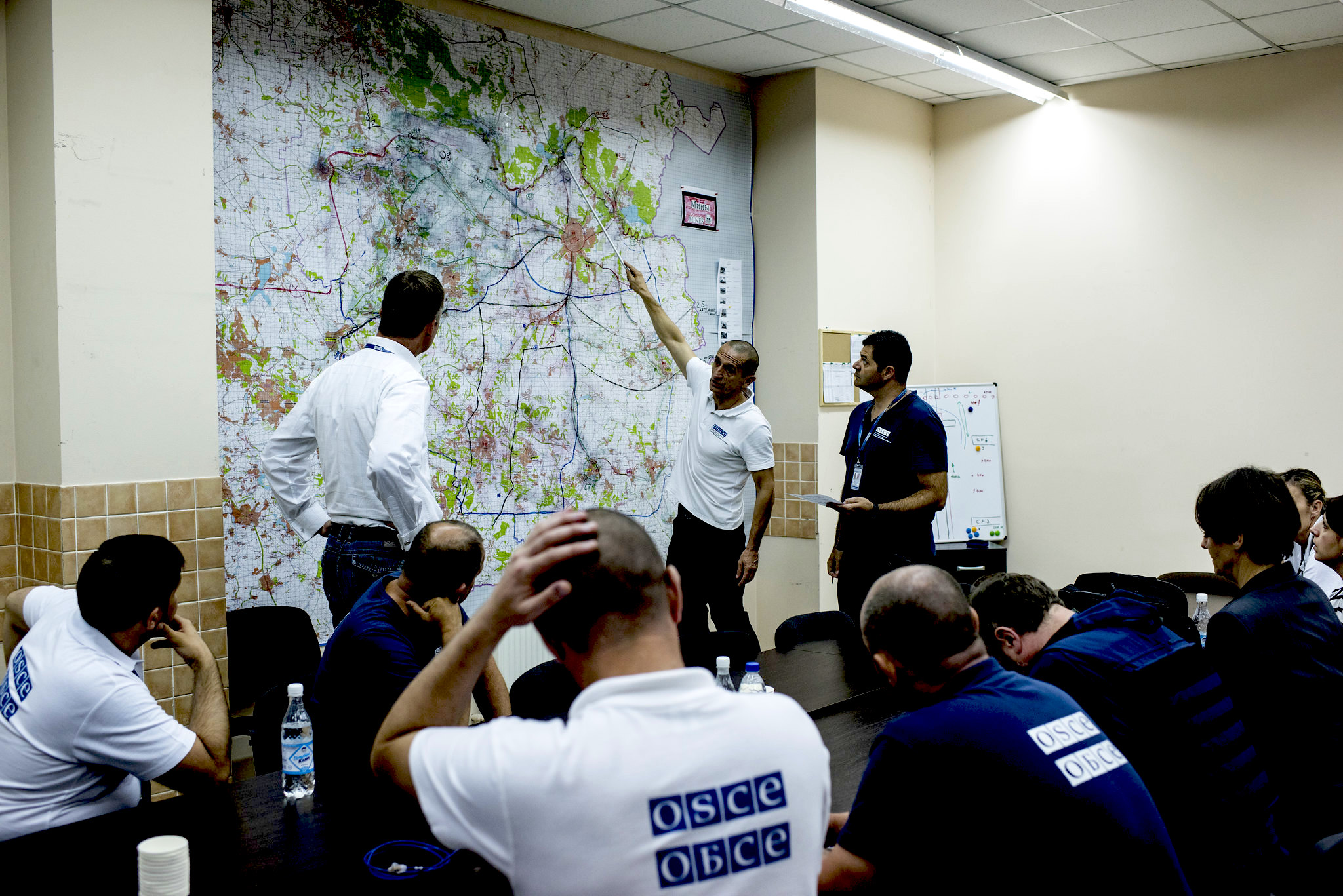The world’s largest regional security organization is mired in crisis, but Mirco Günther underscores the work of its unarmed international observers along the contact line in Eastern Ukraine.

OSCE monitor in Eastern Ukraine, July 2016. (OSCE, Flickr, CC BY-NC-ND 2.0)
By Mirco Günther
International Politics and Society
 In the intensifying Ukraine crisis, the Organization for Security and Co-operation in Europe (OSCE) is one of many communication channels where de-escalation is being pursued. German politicians in particular regularly bring up its potential role in easing tensions. Indeed, on her two recent visits to Kyiev, Foreign Minister Annalena Baerbock also met with German experts of the OSCE Special Monitoring Mission to Ukraine to express the federal government’s appreciation for their important work.
In the intensifying Ukraine crisis, the Organization for Security and Co-operation in Europe (OSCE) is one of many communication channels where de-escalation is being pursued. German politicians in particular regularly bring up its potential role in easing tensions. Indeed, on her two recent visits to Kyiev, Foreign Minister Annalena Baerbock also met with German experts of the OSCE Special Monitoring Mission to Ukraine to express the federal government’s appreciation for their important work.
At the same time, Russia’s permanent representative to the OSCE, Alexander Lukashevich, announced that his country had no intentions to discuss its security initiatives under the OSCE umbrella. According to Moscow, the Organization is characterized by “amorphous structures” and, without a legal international status, lacks relevance. The newly launched OSCE high-level dialogue on European security, he stressed, was “ill-conceived.” So what is the state of the world’s largest regional security organisation as it approaches the 50th anniversary of the Helsinki Final Act in 2025?
The comments from Moscow might at first look like an affront, but they are technically accurate. The OSCE does not have a founding charter under international law. Despite its renaming from a conference (CSCE) to an organization (OSCE) at the Budapest Summit in 1994, it remains a political dialogue forum with quasi-permanent structures. That’s why the 57 countries from Vancouver to Vladivostok that form the OSCE are referred to as “participating states,” not member states.
This is more than just a legal nuance. The organization’s legally shaky foundations have direct consequences for its work. The status, immunity and privileges of its offices and employees must be agreed bilaterally with each country. Decisions taken in the OSCE are not legally binding. Therefore, the OSCE ultimately lacks international legal authority, particularly in relation to other international organizations.
Political Authority

OSCE monitor in Eastern Ukraine, October, 2015. (OSCE/Evgeniy Maloletka, CC BY-NC-ND 2.0)
Against this backdrop, the OSCE’s political authority is all the more important. It is the sole security policy forum that brings together all European countries, post-Soviet states, the United States, Canada and Mongolia. Every week, Russia and NATO countries convene around the same table at the conference center in the Vienna Hofburg.
Because of the OSCE’s deep internal divisions and the prevailing consensus rule, however, far-reaching decisions are rather the exception. When they do happen, OSCE decisions carry considerable normative weight – as with the establishment of the OSCE monitoring mission at the onset of the Ukraine crisis in 2014.
Sadly, such diplomatic success stories are rare. The OSCE is mired in permanent crisis, verging on paralysis. The Swedish chairmanship in 2021 ended with few substantive achievements. The OSCE-hosted Human Dimension Implementation Meeting, Europe’s largest human rights conference, was blocked by Russia. Election monitoring missions are regularly disputed.
Agreements are reached only with great difficulty, if at all, even on largely operational matters, such as the annual budget or the agenda for the annual security conference. In 2020, the organization stared into the abyss when, in an unprecedented leadership crisis, its four most important posts lay vacant for several months, including that of secretary general.
What is the OSCE?

OSCE Permanent Council site at Hofburg, Vienna. (Kaihsu Tai. CC BY-SA 3.0, Wikimedia Commons)
All these challenges stem from fundamental differences concerning the OSCE’s core purpose. Western states emphasize the organization’s uniquely comprehensive approach to security, encompassing political-military, economic, environmental, and human rights issues, which emerged from Helsinki. A number of eastern participating countries have strong reservations about its human rights agenda.
If the OSCE were to be founded today, it is almost inconceivable that an agreement could be reached on its very principles, including the Paris Charter for Europe’s post-Cold War order. Over the years, there have been more than one attempt to bring about meaningful reforms, but to little avail. It seems unlikely that future OSCE chairs will have more success: Poland this year, followed by North Macedonia, Estonia (to be confirmed) and Finland.
The Price of Peace
Many actors bear responsibility for the OSCE’s sorry state. Moscow, for example, has repeatedly weakened OSCE mandates and operational capabilities, while at the same time lamenting the organization’s lacking relevance.
Countries such as Armenia and Azerbaijan often obstruct even the simplest decisions on procedural matters, following a logic of national rivalry. Various host countries have limited the mandates of OSCE field operations, although it needs to be recognized that this is their sovereign right. Western countries, too, have sold the OSCE short, preferring other organizations or bilateral formats. Moreover, many states continue to prioritize austerity policies and fail to give the organization the financial resources it needs.
At the same time, there is rarely any other organization in the world that offers security at a more reasonable price. Its regular annual budget of around €138 million is modest by international standards. The Ukraine observation mission has a separate budget of around €100 million. In 2020, the OSCE had more than 3,500 staff from 51 countries in 20 locations. Its achievements are considerable, as the Ukraine conflict highlights.
Key Role in Ukraine

OSCE monitoring the movement of heavy weaponry in Eastern Ukraine, March 2015. (OSCE, CC BY 2.0, Wikimedia Commons)
The presence of unarmed international observers along the contact line in Eastern Ukraine has made a significant difference, albeit often far away from public awareness. Local Ukrainians have worked side by side with Americans, Russians and Europeans. According to a report by the observers, between July 2019 and October 2021 the OSCE mediated more than 3,000 local ceasefires. Repair works on critical water and electricity infrastructure have given millions of civilians access to fundamental services.
In publicly available daily reports, the OSCE documents compliance (and any non-compliance) with the 2014 Minsk Protocol and is an indispensable neutral voice on the ground. With this in mind, it is greatly worrying that some participating states have decided to pull out their observers fearing further escalation.
There are a number of reasons why the OSCE’s important work does not receive broader attention. For one thing, its observers are often subjected to obstructions. They are denied access to the relevant regions and sites, their freedom of movement is restricted and OSCE unmanned aerial drones are interfered with or shot down.
The organization registered a total of 93,902 ceasefire violations in 2021, which exceeds its capacity to broker ceasefires many times.
Moreover, given the current geopolitical dynamics and fast-paced high-level diplomacy on the world stage, the often cumbersome de-escalation work in the very conflict zone tends to get less attention.
Future Platform for European Security

OSCE Special Monitoring Mission to Ukraine, June 2015. (OSCE, Flickr, CC BY-NC-ND 2.0)
In light of all this, what role can the OSCE play in pursuit of a future European security order?
As in any organization, this ultimately comes down to the political will of the participating states. A number of OSCE key actors currently exhibit a lack of such will. As things stand, the most obvious approach – namely not to re-invent the wheel but to dust off the organization and reinvigorate it – is therefore hardly an option.
The crisis of the OSCE is not of operational or technical nature, but deeply political. Needless to say, this is profoundly regrettable, given its unique wealth of experience in early warning and conflict prevention, as well as crisis management and resolution, and its tried-and-tested toolbox of confidence-building measures – among them the mechanism about “unusual military activities” under the OSCE Vienna Document Ukraine is using to seek clarification from Russia.
In the current crisis and with tensions reaching new heights, all channels of communication are useful and important, whether it be direct talks between Russia and the United States, the NATO-Russia Council, the Normandy Format, shuttle diplomacy or the many discrete talks behind the scenes. Whatever works to help avoid further escalation is to be welcomed.
In the long run, however, we will need a joint platform for European security. For Germany in particular, collective defense as part of NATO, on one hand, and cooperative security for the whole of Europe, on the other, are not mutually exclusive. The continent needs a pan-European security order, even though – at present – this goal appears very distant.
Mirco Günther heads the FES Regional Office for Asia, based in Singapore. Previously, he was FES Country Representative in Afghanistan. In 2014, he helped establish the OSCE Observer Mission in Eastern Ukraine and also worked for the organisation in Kazakhstan and Tajikistan.
This article is from International Politics and Society.
The views expressed are solely those of the author and may or may not reflect those of Consortium News.

Like always when POLITICS win, PEOPLE LOOSE!
Part of this issue is the fact that participating member states independantly instruct their respective monitors. Thusly, they can potentially manipulate the data as well as the narrative. Relevant examples include Kosovo, where OSCE monitors were removed prior to events that were claimed (and later disproved) to be acts of genocide. Again, as of February 13, 2022, in Ukraine, monitors have been recalled from that country just as they’re needed the most and when the rhetoric regarding an invasion by Russia was reaching its crescendo. hXXps://www.osce.org/special-monitoring-mission-to-ukraine/512014 .